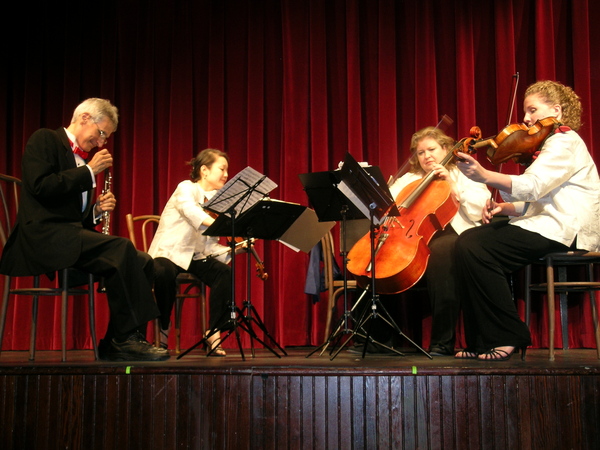
Chamber music made a sparkling debut in the Quogue Community Hall last Saturday evening—complete with strings, woodwinds, harpsichord, and even a trumpet.
The concert, presented by the newly-formed non-profit Quogue Chamber Music, Inc., brought together the Cleveland-based Cavani String Quartet and six accomplished guest artists who have ties to such well-known institutions as the Juilliard School and the Perlman Music Program and regularly perform and teach throughout the U.S. and internationally.
The musical program, ingeniously chosen to highlight the instrumentalists’ solo specialties in the midst of impeccable ensemble playing, featured works of Mozart, Bach, and Beethoven. A capacity audience filled the Community Hall, defying a dark and drizzly night. They were richly rewarded by remarkable performances full of life, light, and joy.
The Oboe Quartet in F Major, K 370, by Wolfgang Amadeus Mozart, opened the program. Gerard Reuter, a member of the Dorian Wind Quintet who is also active as a conductor, joined three members of the Cavani String Quartet: Mari Sato, violin; Kirsten Docter, viola; and Merry Peckham, cello, for this three-movement work that is lively and lyrical in equal measure.
One of the most enjoyable aspects of chamber music is that the listener hears four, or more, individual soloists who create an artistic “whole” greater than its parts. To accomplish this requires musicians of great talent and skill—artists who do not try to outshine one another, but who strive to serve the music and make the composer’s vision an audible reality. This was accomplished here, beautifully, and so much delighted the audience that applause broke out after the first movement.
It was smilingly accepted as the musicians went on to the next two movements, and finished to bravos and more enthusiastic applause.
To reconfigure the stage for the next work, Johann Sebastian Bach’s Brandenburg Concerto No. 2 in F Major, required some logistical creativity, as music stands and chairs were moved around to accommodate the 10 performers needed. If it wasn’t quite “Carnegie Hall,” as one patron remarked, the interval had an informal, improvisatory air—a spirit familiar in the home of Quogue’s famed Hampton Theatre Company.
When the musicians took the stage, Annie Fullard, first violinist of the Cavani Quartet; Gretchen Pusch, flutist; Gerard Reuter, oboe; and Gerald Serfass, trumpet, stood front and center. At the sides, Mari Sato, Kirsten Docter, and Merry Peckham of the Cavani were joined by violinist Areta Zhulla and bassist Rachel Calin. John Root, the collaborative pianist for the studio of Itzhak Perlman, played harpsichord for the occasion.
With Ms. Fullard giving a brisk lead, this interesting ensemble launched into a high-spirited rendition of Bach’s work that filled the hall with energy and warmth. Tone colors abounded, tempos were consistent, dynamics satisfying. To watch the interplay of facial expressions and eye-contact among the players was an additional treat—one not available in the vast spaces of Lincoln Center.
Every musician in the group has sterling credentials in performance and teaching. The Cavani String Quartet has won numerous prestigious competitions, including the Naumburg Chamber Music Award, and concertizes regularly in major series and festivals throughout the country and abroad. The group has been Quartet-in-Residence at the renowned Cleveland Institute of Music since 1988, and have become recognized pioneers in the arts in education field for their innovative outreach programs. Before Saturday’s concert, the quartet presented two programs for elementary school children in Quogue. Future concerts sponsored by Quogue Chamber Music, Inc. will include a similar educational outreach component, according to Jane Deckoff, the organization’s president and impresario.
Flutist Gretchen Pusch, who made her Carnegie Hall debut as a winner of the Artist International Competition, is a member of the Dorian Wind Quintet, and currently serves on the faculty of the Juilliard School’s Music Advancement Program. Gerard Reuter, the oboist, is on the faculty of New York University and also maintains a busy concert schedule. Trumpeter Jerry Serfass is a member of the Springfield, Massachusetts, and Allentown, Pennsylvania, symphony orchestras. His expertise in the difficult, extremely high passages written by Bach and other Baroque composers is deservedly praised, and he soared in the Brandenburg.
Areta Zhulla, a 22-year old violinist, has studied with Pinchas Zukerman and attended the Perlman Music Program for five summers on scholarship. She performed at the Kennedy Center with a group of select Perlman students and is continuing her studies at the Juilliard College Division with Mr. Perlman and Cathy Cho. Rachel Calin, who has played string bass since the age of 9, is on the faculty of the Perlman Music Program. She also pursues a varied concert career.
Yet another Perlman faculty member, pianist/harpsichordist John Root, is a prize-winning artist who has appeared with major orchestras at Avery Fisher Hall and other major venues.
With every member of the group giving his or her best, Bach’s glorious music was given an outstanding performance.
The concert concluded with the Cavani String Quartet performing Ludwig van Beethoven’s String Quartet Opus 59, No. 3 in C Major—one of three works dedicated to Count Razumovsky, a talented amateur violinist and patron of the arts.
“This is an adventure,” Ms. Fullard told the audience in brief, post-intermission remarks that also thanked Ms. Deckoff for creating a new showcase for classical music. And indeed, Beethoven’s challenging work, from the ultra-quiet opening Andante con moto to the final rousing Allegro molto, was performed with panache, yet with great attention to its subtle and introspective passages. As before, the audience could hardly wait to burst into a prolonged ovation.
Quogue Chamber Music hopes to present three concerts a year at the Community Hall, which, incidentally, turns out to be a fine space for such music. Acoustically excellent, it is just large enough to seat a good-size audience, and just small enough to feel intimate. Music lovers have reason to thank Ms. Deckoff and her organization, and future concerts of this caliber are something to anticipate with pleasure.